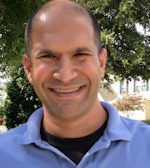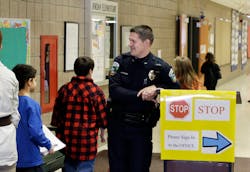Group: No Easy Solution to Safety in Schools
Three months after the tragic Newtown, Conn. elementary school shooting that killed 20 students and six adults, the debate over gun control still dominates the headlines, but the issue of school safety has been addressed in many parts of the country.
Some school districts are hiring armed officers while others are partnering with their local police departments to provide extra security.
The police department in the small town of Jordan, Minn. went a step further, setting up satellite offices inside its schools.
Augustine Pescatore, the President of the National Association of School Safety and Law Enforcement Officials and the Commander of the Philadelphia School District Office of School Safety, told Officer.com that there are no easy answers.
He said that there isn't a one-size-fits-all solution for the nation's schools and that in the end, it depends on what the school district and the school's principal decides works best.
Pescatore said that while his group supports President Obama's call for more officers inside schools -- that move can't be made with haste.
"They must be trained," he said. "They just can't throw in some type of security officer or even a police officer ... Policing in schools is much different than policing on the streets."
He said that the job of a police officer who is on the beat -- writing tickets and preventing crime -- is much different from patrolling a school and dealing with juveniles.
School officers need to be trained in areas such as threat assessment, how to handle physically and mentally disabled children and be aware of discipline policies in the schools, Pescatore stressed.
"You have to know how to deal with students who may not have had breakfast or lunch and come in with dirty clothes and realize that may be a problem or the reason a kid may be acting out."
Security Needs of Schools
Pescatore said that all schools are different and that it's ultimately up to the school district and principal to decide the best approach to making sure that students and faculty are kept safe.
"A principal may want an officer to protect the integrity of the school versus an officer who is going to come in and interact with the kids," he said.
For schools in rural areas, having an armed officer inside the school or a local officer assigned could help cut down the response time.
"You could have a rural school out sitting in the middle of nowhere and the response is going to be 20 minutes to a half an hour for maybe a state police officer to respond."
During the public discussion of school safety, Pescatore said that terminology -- such as school safety, school security, school policing and school resource officer -- have been used interchangeably, and that school officials need to understand the differences before they address the type of security plan they want.
Changes in School Policing
Even before the Sandy Hook Elementary School shooting in Newtown, police departments have been changing the philosophy behind dealing with active shooters in schools, according to Pescatore.
"Prior to that, the response in a major city was for the responding police officers to just contain the shooter and wait for SWAT to respond," he said. "But now, it's an aggressive approach to any active shooter in a school. As soon as any shooting starts, whatever police officer is on the scene will advance and engage the shooter."
Departments across the nation are constantly adjusting their tactics when dealing with active shooters inside schools.
"When you talk about the major tragedies that have occurred -- school shootings -- when you actually have children and school staff shot or even killed, that was the major onus to have a change in philosophy about how they handle an active shooter."
School officials themselves have also changed the way they look at school safety and have switched to more of a comprehensive approach.
"The mental health counselor, the custodian, the teacher, the administrator -- they all have to be talking to each other."
Pescatore said that faculty members can't keep it to themselves when they see a student start becoming a loner, dressing differently,
"I think they're learning that now," he said. "You can take the example of Homeland Security. 'See something, say something.' Don't keep it to yourself."
Advances in Technology
Over the past four or five years, school districts have become more aware of safety and security in the schools and despite dwindling budgets, Pescatore said there has been an emphasis on updating schools with new security tools.
Cameras, CCTV systems, electronic door locks, audio-visual systems, electronic entry and swipe cards are just a few examples of what's being installed inside schools.
"Even now, there is the use of bionics to open doors, where you use a student's fingerprint," he said. "They can use a single fingerprint on a forefinger or an index finger to get in and out of the school."
Partnering With Local Police
The relationship between school police and the municipality police department is an important one.
In Philadelphia, Pescatore said the two work together, and that the city's police commissioner, Charles Ramsey, has provided the district with 75 police officers to help patrol the schools.
"We are in direct communication with the Philadelphia Police Department and our radios are capable of switching over to their major bands," he said. "When we have an emergency, we don't have to run over to the phone to dial 911, we just switch right over to the major police band and talk directly to police dispatchers."
He said that it's to the point now where the school police and the police department know what has to be done during a response.
"We're working side-by-side with them and when something happens -- a major incident, it may be less than a shooting -- our guys are in the fray."
Ultimately, Pescatore said that schools' needs vary and that officials need to consider what type of security is best.
"There's no national rule that's going to apply because every school is different," he said. "From the socioeconomic breakdown of the students, to whether it's an urban school or suburban school ... there are many variables that should be considered."

Paul Peluso | Editor
Paul Peluso is the Managing Editor of OFFICER Magazine and has been with the Officer Media Group since 2006. He began as an Associate Editor, writing and editing content for Officer.com. Previously, Paul worked as a reporter for several newspapers in the suburbs of Baltimore, MD.



